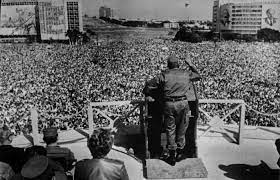 An unprecedented political and moral victory against the Yankee imperialist strategy took place on September 2, 1960, when more than 1 million Cubans, constituted in a National General Assembly, approved at Jose Marti Square the First Declaration of Havana, read by Fidel Castro as a response to the aggressive course of US imperialism and its lackeys against the island.
An unprecedented political and moral victory against the Yankee imperialist strategy took place on September 2, 1960, when more than 1 million Cubans, constituted in a National General Assembly, approved at Jose Marti Square the First Declaration of Havana, read by Fidel Castro as a response to the aggressive course of US imperialism and its lackeys against the island.
In this way, the willingness of the people to defend their revolutionary project was made clear, as was demonstrated shortly afterwards with the defeat of the mercenaries during the Bay of Pigs invasion in April 1961.
Never before since World War II, in peacetime, had the U.S. engaged in a covert and not so covert war of economic, diplomatic and political blockade, terrorist actions, media and military aggressions as the one launched against the Revolution since practically its triumph on January 1, 1959.
In order to justify in the international arena the mercenary aggression that was being prepared, the 7th Meeting of Foreign Ministers of the OAS was held in the capital of Costa Rica from August 22 to 29, 1960, which condemned Cuba for allegedly being an instrument for the expansion of communism in the continent, in the interests of the USSR and the People’s Republic of China.
With this accusation, the White House hoped to stimulate among the nations the anti-communist prejudices sown in Latin America for almost half a century and together with the almost complete dog-like subordination of the governments of the region, they believed that it was enough to isolate the Cuban Revolution, demoralize and divide its people to facilitate its military defeat, as happened in 1954 with the progressive government of President Jacobo Arbenz in Guatemala.
Shortly before the meeting of the Organization of American States (OAS), Fidel warned about the plans of the Northern neighbor and predicted their results when he said that if the Yankees tried to destroy the Cuban Revolution by force, they would not find their Guatemala here, but would find their Waterloo here.
Even in the OAS itself, the enemy’s calculations failed in the face of the firmness of the island’s word, expressed by its delegation headed by Foreign Minister Raul Roa, who upon his arrival in Costa Rica proclaimed: “Cuba did not come as a prisoner, but as a prosecutor” and specified: “It is here to launch its implacable accusation against the richest, most powerful and aggressive capitalist power in the world, without fear or fear, in a loud voice”.
The Caribbean Island denounced a false declaration against the country dictated to its puppets by the State Department, in complicity with the OAS, which supported the aggressions against Havana. In view of this fact, the island delegation withdrew from the conclave after the words of the Chancellor of Dignity, who said: “I am leaving with the people and with my people the peoples of Latin America are leaving here”. Roa’s words raised waves of support and demonstrations in all the peoples of the continent and in other countries of the world.
But the main response in Cuba to the ignominy of San Jose, Costa Rica, was the First Declaration of Havana, which stated: “The National General Assembly of the People of Cuba also rejects the attempt to preserve the Monroe Doctrine, used until now, as foreseen by the Apostle, to extend the domination in America of the voracious imperialists.”
It also denounced the imperialist policy of The Union during more than a century of interventions in Mexico, Nicaragua, Haiti, Santo Domingo, Cuba and Puerto Rico to seize their lands and establish neocolonial ties that guaranteed to make the region the backyard of the empire.
It also stressed: “The National General Assembly of the People of Cuba categorically denies that there has been any pretension on the part of the Soviet Union and the People’s Republic of China to use Cuba’s economic, political and social position to break the continental unity and endanger the unity of the hemisphere”.
In the face of the false concept of representative democracy that serves only the interests of the national oligarchies, he proclaimed the right of the peoples to choose the revolutionary path and to practice the “duty of the workers, peasants, students, intellectuals, blacks, Indians, youth, women, the elderly, to fight for their economic, political and social demands.”
Finally, he stated that “To that sister voice, the National General Assembly of the People of Cuba responds: Present! Cuba will not fail! Here is Cuba to ratify, before Latin America and the world, as a historic commitment, its unrenounceable motto: Fatherland to Death!”